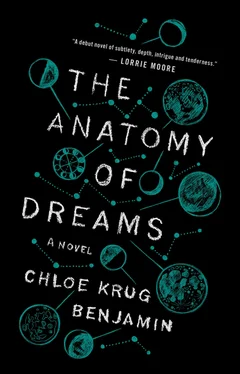“Do you think we should be concerned?” I sat down between them, crossed my arms. “I mean, if it’s somebody calling about the case, why would they hang up? Wouldn’t they ask for whatever they wanted when we pick up?”
“Maybe that’s what they wanted,” said Gabe.
“Just to know we’re home? Why?”
I looked to Keller, but he was impassive.
“Listen,” I said. “I’m sick of the conspiracy theories. Living with this kind of anxiety—it can’t be worth it. Why don’t we come out and say Anne was working with us? What’s the worst that could happen? We could help the prosecution, maybe even gain a little publicity. That’s what you believe, isn’t it? That there’s no such thing as bad publicity?”
“I didn’t say that. Not exactly.” Keller rubbed the back of his neck. His eyes were heavily lidded, and the skin of his cheeks seemed to hang. “We would have to think it through.”
“You can’t be serious,” said Gabe. “That would be tantamount to turning ourselves in. The university wants a success story. Our money is tight as it is, and after the mess that happened with Jamie, we can’t afford to tell them that one of our participants went off and killed someone.”
“Well, maybe we need to face up to the fact that we don’t have a success story,” I said.
Gabe glared at me. Not in front of Keller —I knew that was what he was trying to tell me.
“We still might,” Gabe said.
“We’d better hope so,” said Keller, “for your sakes as well as mine. I can’t pay you out of pocket.”
“I can’t imagine that things are already that dire,” I said. “It’s not like you have a team of twenty researchers. You’ve only got the two of us.”
I didn’t realize what I’d said until I saw Keller’s reaction. To an outside observer, he would have looked just the same. But I saw the way his nose twitched—a sharp little rabbit’s motion, as if he’d smelled something sour. He looked out of the window, where the sidewalk had been scraped of snow and doused in salt.
“You’re right about that,” he said. Then he stood, pulled on his coat, and walked outside to his car.
Gabe’s fingertips were white against the table.
“What the hell do you think you’re doing, bringing that up?” he asked. “The man lost his wife.”
I was too surprised to be indignant. “I didn’t mean it like that.”
“Well, maybe you should think a little more before you open your mouth. Think about the implications of what you’re saying. You can’t talk to him that way.”
“I talk to him like an equal.”
“That’s my point. He’s our boss.”
“Oh, he’s a lot more than that, and you know it.”
“So talk to him like he’s more than that,” said Gabe. “Not like he’s some kind of failure.”
“He’s not your parent, Gabe. He’s not your therapist. You can say whatever you want about yourself, but you had no right to tell him about my dreams.”
I got up from the table and washed my coffee cup. I was already on edge, my anger fueling.
“I’m worried about you,” said Gabe. “I confide in him because I trust him. Is that such a crime?”
“Christ, Gabe.” I dropped the mug into the dish rack, where it clanged against a bowl. “How much is he paying you?”
“Same amount as you.”
“Then you’re working overtime.”
Gabe was still sitting down, but his shoulders were clenched around his neck like a boxer ready for attack.
“Don’t you have any faith?” he asked.
“Not blind faith. Not blind.”
I turned toward the sink and wiped my hands, but I could feel Gabe staring at my back. When I turned, his jaw was tight, but his eyes were wide with misery.
“What’s happened to you, Sylvie?”
I wanted to claw him. The sight of him in such pain—and worse, to be blamed for it—was more than I could stand.
“What happened to me?” I asked. “What happened to you ? You used to be an insurgent, Gabe. A renegade.”
“And now?” he asked. “What am I now?”
His fists rested on the table. Below, his legs were crossed at the ankles, feet clad in the wool socks Keller had given him one Christmas.
“A lapdog,” I said.
I walked to the screen door that led to the back porch; it wheezed open, coughed shut, and there was cold air in my face. My breath was rickety, my cheeks hot. When I blinked, I saw firecrackers. I went to the fence, where I knew Gabe couldn’t see me, and ran my palms over the rough, papery surface. There was a loud snuffle behind me, and I jolted away from the wall, expecting to see one of the sly, fanged raccoons that ferreted through our trash bins at night. But nothing was there; the noise had to be coming from Thom and Janna’s garden. I came close to the fence again and peered through the sliver between two planks.
Thom leaned against the juniper tree as we had done together on Thanksgiving. There was an open book on his lap; his head was bowed and unmoving. The snuffling noise came again, followed by a high whistle. Thom’s head rose jaggedly, as if pulled by strings, before bobbing back to stillness. He was snoring. The pattern repeated every few seconds, familiar as a song I knew by heart.
“Gabe?” I called. My chest squeezed like a fist, tightness radiating up to my jaw and throat. I stayed where I was until my vision cleared, the shapes of our yard reassuming their positions like actors after intermission. There was the rhododendron shrub, its petals vivid and velvety as scraps of brilliant fabric; there were the dogwood trees, their branches growing horizontally, as if to reach out for each other.
There was a quick movement in the window of our bedroom—a flash of brown as someone’s head withdrew.
Gabe had been watching me. The bedroom window was open, our eclipse drapes pushed to one side.
I walked back into the house, grabbed my coat from the closet and took my keys from the basket by the door. On second thought, I took Gabe’s, too, shoving them deep into my pocket so he couldn’t come after me.
• • •
The parking lot was empty when I arrived at the lab. The Hungarian researcher was with family in Eastern Europe; I didn’t know about the other researcher. I flashed my ID card and stepped through when the doors opened for me. My footsteps made a flat rapping noise as I took the stairs to the basement, the fluorescent lights turning on automatically. A migraine in a box —that was what Keller called this building. I knew he had suffered from headaches for years, though he almost never mentioned them. Every few months, I saw him reach into his pocket for a small tin filled with flat, white rounds. If I didn’t know any better, I’d have thought they were mints.
The lock on Keller’s office door jammed for a moment before giving way. Inside, it was silent: the air boxed and windless, the computer waiting patiently to be woken.
I sat down in Keller’s chair and slowly spun. Now that I was here, I didn’t know what to do with myself. I’d come to look for something, but I didn’t know what it was—all I knew was a rumbling, bone-deep feeling of unease, the Madeline sense that something was not right. Keller’s new presence at our house. His hushed conversations with Gabe. It was as if there were a dark spot dancing at the edge of my vision, a jumping bean, slipping out of view whenever I looked at it directly.
I came to a stop in front of the file cabinets. Keller had asked me to reorganize all of our hard-copy files. Right now, they were arranged in alphabetical order by last name, but he wanted them ordered chronologically by case number. It wasn’t difficult work, but it would take time—Keller had observed over three hundred subjects. I had been around for forty-eight of them, Gabe one hundred and twelve. The project afforded me unlimited access to Keller’s hard-copy files.
Читать дальше












